 What Is a License Plate Reader and Can Police Track You Using It?
What Is a License Plate Reader and Can Police Track You Using It?
Table of Contents
- New Hampshire License Plates
- New Hampshire License Plate Design and Formats
- New Hampshire Vanity License Plate
- Most Popular License Plate in New Hampshire
- New Hampshire License Plate Lookup
- What Do I Need to Get a License Plate in New Hampshire?
- Differences Between a Passenger License Plate and a Commercial License Plate in New Hampshire
- How to Renew License Plate in New Hampshire
- How to Transfer a License Plate in New Hampshire
- New Hampshire License Plate Lookup Frequently Asked Questions (FAQ)
 New Hampshire License Plates
New Hampshire License Plates
A New Hampshire license plate is a flat aluminum plate, or tag affixed to the front or rear of vehicles registered with the state. A New Hampshire license plate is unique for each vehicle, thereby serving as an identifying serial for the vehicle. The Division of Motor Vehicles in the state's Department of Safety issued the New Hampshire license plate. The New Hampshire DMV requires all motor vehicles in the state to affix license plates at the front and rear of the vehicles, except for trailers and motorcycles, which only require one license plate.
The New Hampshire DMV issues the following types of licenses:
- Passenger Plate: The passenger plate is the standard issue type in New Hampshire
- Decal Plate: Decal plates in New Hampshire are similar in appearance to standard passenger license plates but have a unique feature: a 3"x3" blank square on the left side. This space is reserved for a special decal issued by a 501(c)(3) organization authorized by the legislature. These authorized organizations have the ability to sell these decals for a fee, which is used to fund specific programs or causes. Veteran decal plates are only issued to motor vehicles registered pursuant to RSA 261:87-b. A veteran decal plate has a 3"x 3" blank square on the left side of the plate and contains a distinguishing veteran design
- Vanity Plate: A vanity plate is a license plate customized by the customer and approved by the New Hampshire DMV
- Veteran Plate: This plate is issued to a vehicle registered under RSA 261:87-b
- Conservation (Moose Plate): This is a standard issue New Hampshire license plate with the Moose logo on the left side
- State Parks Plate: This is a standard issue New Hampshire license plate with the Parks logo on the left side. This plate allows admission into many New Hampshire state parks
- Conservation Parks Plate: This is a standard issue New Hampshire license plate but with Moose on the left side, Park logo on the right
- Motorcycle Plate: This plate is issued to motorcycles and is also available in vanity plates
 New Hampshire License Plate Design and Formats
New Hampshire License Plate Design and Formats
New Hampshire's standard-issue license plate has embossed dark green serial printed in the middle on a reflective graphic plate with Old Man of the Mountain and Cannon Mountain against a pale blue sky. Centered at the bottom of the plate is the word "New HAMPSHIRE", with "New" screened above and "HAMPSHIRE" below. Also, at the top center is the word "LIVE FREE OR DIE", screened in dark green. This design has been issued to customers since January 1999.
Pursuant to RSA 261:B, the New Hampshire DMV began offering the state's newest plate type - Decal Plates, on July 3rd, 2017. Decal plates resemble regular passenger license plates. However, they have a 3"x3" blank square on the left side of the plate.
New Hampshire vanity plates are composed of alpha characters, alphanumeric characters, or a combination of alphanumeric characters and symbols. Conservation or moose plates have a moose logo on the left side, state parks plates are designed with the park's logo on the left side, while conservation parks plates are designed with Moose on the left side and the park logo on the right. Conservation park plates are limited to four digits, and the motorcycle plate is limited to 5 characters.
New Hampshire license plates vanity license plates are centered by the graphic on the plate and not by the center of the plate. They have the following character limits:
- Passenger: 7 characters
- Apportioned, Commercial, Conservation, Trailer, State Park, Veteran, Active Duty Military: 6 characters
- Antique: 6 characters (4 with Old Man Replica)
- Walking Disability, Conservation State Park, Purple Heart, Street Rod, Disabled Veteran: 4 characters
- National Guard, Decal, Veteran Decal: 5 characters
- Motorcycle: 5 characters (ampersand (&) not available)
- Veteran Motorcycle: 4 characters (ampersand (&) not available)
- Purple Heart Motorcycle, Walking Disability Motorcycle: 3 characters (2 must be letters, ampersand (&) not available)
Standard issue, Commercial, and specialty license plates:
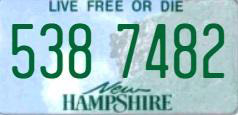
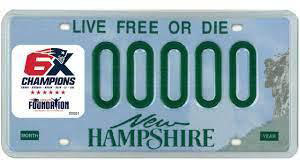
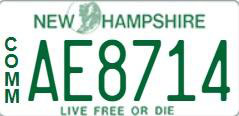
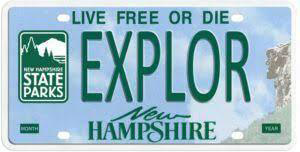

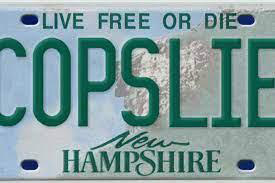
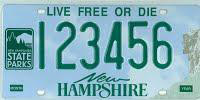
* Source: New Hampshire Department of Motor Vehicles
 New Hampshire Vanity License Plate
New Hampshire Vanity License Plate
A vanity license plate, also known as a personalized license plate, is a special type of license plate that allows you to choose a custom combination of letters and numbers instead of the standard alphanumeric identification code used by the New Hampshire DMV. A vanity plate offers a way to express your interest in your vehicle.
To apply for a vanity plate, bring a completed Application for Vanity Plates to your town or city clerk's office to process your registration and license plate application. Alternatively, you can apply for a vanity license plate at any DMV location processing registrations after processing the town or city portion of your registration. You may also mail the vanity plate application, town portion of the registration, and a check for the applicable fees to the Concord DMV at:
NH Dept. of SafetyDMV - Registration Bureau
23 Hazen Drive
Concord NH 03305
If you are changing your current plate to a vanity plate at any time other than your renewal, bring your Application for Vanity Plates with your current vehicle registration to your city clerk's office or the nearest DMV location.
If your request for a vanity plate is accepted, the plates will be sent to your mailing address. However, if your request is denied, you will receive a letter by mail that includes a set of number plates and a new registration. Any fees paid for the vanity plate will be credited to your account. You will then have the option to select a new plate or request a refund for the vanity plate fees.
The cost for a vanity plate in New Hampshire includes your town or city and state registration fees, and $40.00 (for 12 months, prorated per month) for the vanity Plate fee, and an $8.00 plate fee (a one-time fee). However, some plates have an additional yearly non-prorated fee:
- Conservation (Moose) Plates: $30.00
- State Park Plates: $85.00
- Decal Plates (Passenger): $15.00
- Decal Plates (Veteran): $15.00
If you decide to change your plate before your next vehicle registration renewal, the cost will be $23.00, including the $8.00 one-time plate fee, a $15.00 certified registration fee, and any prorated vanity plate fees, if applicable.
Per New Hampshire Administrative Rule Saf-C 514.62(c), all vanity plate requests must not:
- Include a zero
- Imply an affiliation with a government agency that is false
- Have combinations of characters or characters which may cause difficulty in distinction or identification
- Have more than 7 characters
- Have any characters other than numerals, ampersands, plus signs, minus signs, or letters
- Have more than 2 ampersands, minus signs, or plus signs which must not be consecutive, such as &&
- Have only numbers or only numbers and ampersands, plus signs, or minus signs
- Refer to or be associated with any of the following in any language, whether read forward, backward, by mirror image, or by phonetic spelling:
- Violence
- Intimate body parts or genitals
- Sexual or excretory acts or functions
- Gangs
- Drugs, drug culture, or illegal intoxicants
- Illegal activities
- Words or terms of obscenity or profanity
- Racial, ethnic, religious, or sexual orientation bigotry or hatred
You can check the availability of a vanity plate by using the DMV's Vanity Plate Search feature. However, while the search feature may show that your plate choice is available, it does not reserve the plate for you, and it may be taken by the time you visit a DMV office. Additionally, the graphic displayed in the search results does not accurately represent the final plate design.
 Most Popular License Plate in New Hampshire
Most Popular License Plate in New Hampshire
Common special-themed license plates in New Hampshire include:
- Active Duty Military Plate
- Agricultural Plate
- Ambulance Plate
- Antique Plate
- Apportioned Plate
- Construction Equipment Plate
- Commercial Plate
- Farm Plate
- Farm Tractor
- Former Prisoner of War Plate
- Handicap Plate
- Hearse Plate
- National Guard
- Pearl Harbor Survivor
- Purple Heart
- School Bus
- Special Commercial
- Street Rod
- Trailer
- Veteran
 New Hampshire License Plate Lookup
New Hampshire License Plate Lookup
A New Hampshire license plate lookup allows you to gather information about a vehicle registered in the state using its license plate number. This information includes the vehicle's make and model, registration status, and accident history. Buyers of used cars often use it to verify the vehicle's history before making a purchase or by law enforcement agencies for investigative purposes.
Recordsfinder allows you to look at a vehicle's history using the vehicle's license plate number by searching its database of public records to find information about the vehicle associated with that license plate number.
New Hampshire Reverse License Plate Search
A reverse license plate search is similar to a license plate search, as the term can be used to refer to a license plate search. A license plate search or a reverse license plate search is typically conducted when a person has a license plate number and wants to know more about the vehicle. Information retrieved from this search includes details such as the make and model of the vehicle, registration, and status. Law enforcement agencies and vehicle buyers often use license plate searches.
RecordsFinder allows you to perform a license plate search or a reverse license plate number search with the license plate number of a vehicle. Note that only non-sensitive information can be obtained via either search on Recordsfinder in accordance with federal and state driver privacy laws.
 What Do I Need to Get a License Plate in New Hampshire?
What Do I Need to Get a License Plate in New Hampshire?
To obtain New Hampshire license plates for your vehicle, you must complete a titling and registration application for the vehicle.
An application for a new title in New Hampshire can be completed either by a New Hampshire dealership at the time of purchase or by a town/city clerk at the time of registration. The completed Title Application is then forwarded to the DMV for processing. Once received by the DMV, a new title is produced and mailed directly to the vehicle owner or lienholder within forty to fifty calendar days.
New Hampshire law mandates that the title must be mailed to the owner or lienholder unless the owner provides a notarized statement requesting the title to be sent to a third party.
You can apply for a new title for your vehicle at:
- New Hampshire Town or City Clerks
- New Hampshire Licensed Automobile Dealers
- New Hampshire Lienholders
Registering a vehicle in New Hampshire involves a two-part process. With the exception of mopeds, motor vehicles must initiate their registration process at the town or city clerk's office in the town or city of residence. The second part of the process involves a state transaction, which may be facilitated by the town or city clerk acting as a municipal agent of the state for an additional fee.
To register a vehicle in New Hampshire, the first step is to visit the town or city clerk's office to establish residency and commence the registration process. Once the clerk confirms residency, if you possess the title of the vehicle or it is exempt from title requirements, you can complete the entire transaction at the clerk's office. If there is an out-of-state loan or the vehicle is leased, refer to the 60-day temporary plate page on the New Hampshire website for further instructions.
Although the process for vehicle registration is similar, there are minor differences, such as when:
- Registering a vehicle purchased from a New Hampshire dealership: If you are a resident of New Hampshire and have purchased the vehicle from a retail dealership in the state, present to your town or city office clerk the certificate of title or the blue copies of your title application. Also, provide proof of residency, if you have not already done so, as established by your town or city
- Registering a vehicle purchased from an out-of-state dealership: Present your title from the dealership or the New Hampshire title application from the lienholder to your town or city clerk. If the vehicle is brand new, present a Manufacturer's Statement of Origin (MSO). Proof of residency may also be required if you have not submitted it as established by your town or city
- Registering a vehicle purchased in a private sale: You must present a properly assigned title certificate to the town or city clerk in the municipality where you reside. Also, provide proof of residency if you have not done so as established by your municipality authority
- Registering a title-exempt vehicle purchased in a private sale: Present a bill of sale as required under RSA 261:148. Also, you need proof of VIN, which may be an original or copy of the vehicle title, a previous copy of a New Hampshire vehicle registration, or a properly completed VIN Verification form. Proof of residency may also be required
Note that since the vehicle registration process is a 2-part process, there are fees due to both the town or city and the state. In addition to the registration fees, an $8 plate fee applies for the first time you order plates. For more information on fees, review RSA 261:141 for the state fees and RSA 261:153 for town or city fees.
 Differences Between a Passenger License Plate and a Commercial License Plate in New Hampshire
Differences Between a Passenger License Plate and a Commercial License Plate in New Hampshire
New Hampshire defines commercial vehicles differently from passenger vehicles. While passenger vehicles are vehicles not used for public or livery conveyance for passengers and not rented to others, the state, per RSA 259:12-e, defines commercial vehicles as:
- A vehicle with a gross vehicle weight (GVW) rating of 26,001 pounds or more
- A vehicle with a gross combination weight (GCW) rating or actual weight of a minimum 26,001, inclusive of any towed unit with a GCW rating or actual weight of over 10,000 pounds
- A vehicle used or designed to transport 16 or more passengers, including the driver
- A vehicle of any size used in the transportation of hazardous materials is required to be placarded pursuant to 49 C.F.R. part 172, subpart F
According to N.H. Code Admin. R. Saf-C 514.13, commercial license plates must:
- Have 3-6 characters, one of which must be the letter "A", one of which must be a letter, and the remainder of which must be numerals
- If a numerical commercial plate:
- Has the letters "COMM" on the left vertical border; and
- Has a numeral from 1-999; or
- If a vanity plate has characters conforming with the requirements of Saf-C 514.61(c)
Per N.H. Code Admin. R. Saf-C 514.14, special commercial plates must be issued to one-third-rate vehicles, as stipulated in Saf-C 508.02, when the vehicle would otherwise have to register as an apportioned vehicle to travel interstate. Special commercial plates must:
- Have the words "SPEC COMM" on the left vertical border; and
- Have a numeral from 1-999
Critical differences between passenger and commercial license plates in New Hampshire are shown in the table below:
| Features | Passenger License Plate | Commercial License Plate |
|---|---|---|
| Vehicle Use | Personal | For hire, profit, or compensation |
| Plate number arrangement | 7-character serial |
Have 3-6 characters, one of which must be the letter "A", one of which must be a letter, and the remainder of which must be numerals If a numerical commercial plate:
|
| Requirements for obtaining | Complete vehicle titling and registration with the DMV. The DMW issues the license plate | Complete vehicle titling and registration with the DMV. The DMW issues the license plate |
 How to Renew License Plate in New Hampshire
How to Renew License Plate in New Hampshire
Licensed plates are renewed when you renew your vehicle registrations. To restore your registration, bring your renewal notice or current vehicle registration to the town or city of residence to pay the required permit fees. Note that the DMV will not process the registration without the town or city fees being paid first. Many towns or cities double as municipal state agents and can complete the state sections of your renewal registrations for a small fee. The New Hampshire DMV recommends that you contact your town or city clerk or tax collector directly to find out if online registrations or mail registrations are permitted.
If you are temporarily out of state, you must send your renewal notice or registration certificate to your New Hampshire town or city of residence within 4 months before your current vehicle registration expires. You should also notify the clerk if you want them to complete the state portion of the application. Note that the state will not complete your registration if the town fees have not been paid. The DMV recommends including the out-of-state address where you would like your registration mailed.
 How to Transfer a License Plate in New Hampshire
How to Transfer a License Plate in New Hampshire
New Hampshire allows motorists to transfer license plates from a currently registered vehicle to another one registered in their name. For instance, if you purchase a new vehicle, you can put the license plates from another you own on the new vehicle.
To transfer a license plate, you must bring your current registration of the plate to be transferred and proof of ownership for the new vehicle to your town or city clerk in the municipality where you reside. The DMV allows credit transfer if the owner's name on the old and new registrations do not change. Once license plates have been transferred, the old vehicle is no longer registered and may not be driven on a New Hampshire roadway.
If you are a surviving spouse, bring your vehicle's title and lienholder information to your town or city clerk, along with a copy of your spouse's death certificate. If the vehicle is new, no credit will be given.
 New Hampshire License Plate Lookup Frequently Asked Questions (FAQ)
New Hampshire License Plate Lookup Frequently Asked Questions (FAQ)
Can I Get a Replacement for My Lost License Plate in New Hampshire?
Yes. Pursuant to N.H. Code Admin. R. Saf-C 1709.02, you can get replacement license plates if your license plate is lost. Firstly, you must report to a law enforcement officer before making a replacement plate request, as you will be required to show the date the loss was reported to the police.
You may replace your lost plates with your current plate number (unless it was stolen) or obtain a new plate number. To purchase replacement license plates, you must be listed as an owner on the vehicle registration or, in the case of a business, an authorized signer for the business. After, you must present the vehicle's current registration as it will be exchanged for a new registration, your photo ID, the appropriate fee, and a completed Application for Replacement Plates and Decals. If the registration is not available, you must purchase a duplicate registration. The application may be completed at your town or city clerk's office.
What Do Police See When They Run Your License Plates in New Hampshire?
Law enforcement in New Hampshire can run license plates for several reasons. When they do, they typically access information such as:
- The vehicle's registration status
- Vehicle information such as the make, model, and year of manufacture
- Any pending warrants and criminal history
- Stolen vehicle alerts
What Is the Penalty for Driving with an Expired License Plate in New Hampshire?
In New Hampshire, driving with an expired or unregistered vehicle carries several penalties:
- A fine of up to $100 for the first offense and up to $250 for subsequent offenses
- Suspension of your license and registration until you pay the necessary fees and fines
- Inability to renew your driver's license or register your vehicle until all outstanding fees and fines are paid
- Possible impoundment of your vehicle
- Increased insurance rates
Do I Need to Return License Plates in New Hampshire?
New Hampshire motorists are not required to surrender their license plates. However, they cannot use license plates removed from an old car to a new car registered in their name without undergoing a proper license plate transfer application to the DMV.
Can I Keep My New Hampshire License Plate If I Move to Another State?
If you are moving out of New Hampshire to another state, you may choose to keep your license plates. If you decide to turn them in, you can return them to your town or city clerk's office. Alternatively, you may destroy the plates with tin-snips and recycle them.
What Size Are License Plates in New Hampshire?
New Hampshire license plates are 12 inches in width and 6 inches in height.
How Long Can You Drive with Temporary License Plates in New Hampshire?
According to RSA 261:57, New Hampshire residents purchasing a vehicle from an authorized dealership within the state will receive a 20-day temporary plate if the vehicle is deemed roadworthy. Within this 20-day period, the vehicle must be registered with both the town and state for permanent registration plates.
New Hampshire's 20-day registration plates are obtainable through drop-box services or appointments at select DMV locations. If you opt for an appointment, ensure to bring this information along. If you are using drop-box services, enclose the following in an envelope and drop it in one of DMV designated Drop Box locations:
- A copy of the front and back of the vehicle title signed by the seller and buyer or a copy of the bill of sale. The bill of sale must have the date of the sale, VIN, the vehicle's description (make, year, model, color, number of cylinders, and body style), signatures, and addresses of both the seller and buyer
- Driver License or Non-Driver ID (if you are using drop-box, you must place a photocopy in the envelope)
- $10.00 fee made out to "State of NH-DMV"
For new New Hampshire residents with vehicles that have out-of-state lienholders or are leased, there is an option for a 60-day temporary plate upon registration in accordance with RSA 261:57-A.
What Are the Steps to Renew a License Plate in New Hampshire?
In order to renew your license plate in New Hampshire, renew your vehicle registration by following these steps:
- Visit your town or city clerk's office in the municipality where you reside
- Pay the applicable town fees
- Pay an additional fee as charged by the town or city office for the office to complete the state portion of your registration
What Do I Do If My License Plate Is Lost or Stolen in New Hampshire?
If your license plate is lost or stolen, you may request replacement plates and decals if they were at your town or city clerk's office with the following information:
- An Application for Replacement Plates and Decals (RDMV 125)
- The appropriate fee
- The valid registration for the vehicle
- Your NH Driver's License
You may also use the DMV's Drop-Box Services by enclosing photocopies of your New Hampshire driver's license and vehicle registration along with the application and appropriate fee.




